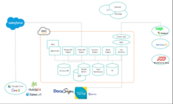AWS Head of Payments: Fraud, Credit Decisioning Drive Move To The Cloud

Limited Time Offer!
For Less Than the Cost of a Starbucks Coffee, Access All DevOpsSchool Videos on YouTube Unlimitedly.
Master DevOps, SRE, DevSecOps Skills!
Source:-https://www.pymnts.com/
We’re seeing a shift in financial services that will have a lingering — and, in some ways, permanent — impact on payments, hastened by the continued migration of financial institutions (FIs) and merchants to the cloud.
In an interview with PYMNTS, Mark Smith, head of payments for financial services at Amazon Web Services (AWS), said that “COVID has changed the conversation we’ve been having with payment customers, and it’s accelerated the trends we’ve been seeing over the past few years.”
Much of that changing conversation has to do with a pivot in consumer behavior, he said, which has spurred AWS’ own customers to migrate to cloud applications. “We all recognize that payments transactions are ‘bursty,’” Smith told PYMNTS. “We see a lot of this during the holidays and with seasonal shifts. But we weren’t ready for this kind of panic-buying, all done online.” One reason is to enhance card processing, as firms on the merchant processing side — which are focused on eCommerce — need to scale up and down as necessary based on those aforementioned shifts in consumer behavior, and as more transactions move online.
AWS, in another tailwind accelerating enterprises to the cloud, has encountered concerns from clients about preventing fraudsters from capitalizing on volume trends toward card-not-present transactions, he said.
Transforming Credit Decisioning
The cloud is also helping to transform credit decisioning amid some of the financial hardships wrought by the pandemic. Many of the ways that AWS customers are using data to lend and to make credit decisions must adapt to the fact that pandemic-related financial hardships might not be a clear indicator of future creditworthiness.
Smith pointed to the trend that he believes could prove to be the stickiest: emerging payments. Many of AWS’ customers had been focused on moving to contactless or taking advantage of faster payments even before COVID-19. “When we come out of the pandemic, many of the initiatives are going to stick around,” he predicted. Smith mentioned that customers like Venmo, a rapidly growing peer-to-peer (P2P) payments app with over 60 million active users, as well as touch-free payment options including quick-response code (QRC) solutions, tap-to-pay or in-app purchases.
Against that backdrop, financial institutions (FIs) are tightening their focus to improve how they engage with their end customers — reaching toward creating frictionless payment experiences with, for instance, QR codes or voice commerce, sidestepping the physical handovers of cards or cash. And AWS’ corporate clients are increasingly interested in newer, alternative payment methods such as central bank digital currencies (CBDCs), but must tackle the challenges of legacy infrastructure.
“Even for customers like FinTechs that have been around for only 10 or so years — and maybe aren’t dependent on the mainframe — we’ve been working with them to break down the ‘monolith’ into microservices using experts with domain expertise,” Smith said. Data, of course, fuels the cloud — and, as Smith noted, payments contain a wealth of data, both real-time and historical.
In payments, he said, there have been two focal points for data analytics. One, as mentioned above, is around fraud prevention, and the other is tied to credit. From a fraud prevention standpoint, NuData Security (part of Mastercard) enhances authentication by analyzing users’ digital profiles with passive biometrics. As a user interacts with the system, hundreds of anonymized data points are analyzed in real time — from typographic rates to patterns in technology use — to detect anomalous activity before a fraudulent transaction occurs.
Firms have been building data lakes and using machine learning to make rapid decisions and open up new pools of customers (particularly among unbanked/underbanked and thin-credit or no-credit-file customers). A good example of this is the San Francisco-based, born-in-the-cloud FinTech Affirm, which delivers consumer financing in the form of installment loans through thousands of retailers. Using machine learning from AWS, Affirm is able to make loan underwriting decisions in seconds, not days. Smith continues, “At Affirm, better credit decisioning has increased merchant orders by 85 percent and repeat orders by 20 percent.”
Corporates will thrive, post-pandemic, with modern data analytics — and, in a way, automation is a form of liberty, since shifting manual tasks to automation enables organizations to offload undifferentiated heavy lifting to AWS and focus on their core business and customers.
“This is an unprecedented shift in behavior, and financial institutions and payment customers realize they need to step back and say, ‘how do we more nimbly and easily adapt to changing customer behaviors and expectations?’” Smith told PYMNTS.